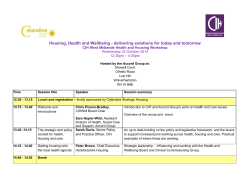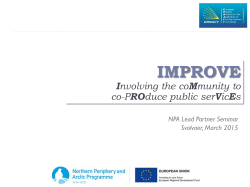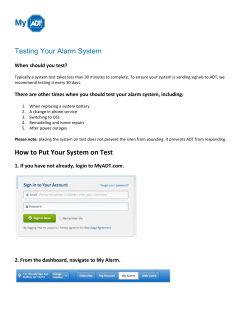
Using technology to promote people`s
Using technology to promote people’s independence, safety and wellbeing 1 Telecare MECS Stirling has had a MECS community alarm service since the 70’s. Over the last few years we have been working closely with colleagues in Health, Housing Services and other partner agencies to expand the range of technology and services which we can provide both in and out of the home. MECS lets vulnerable people use technology to summon help and assistance at the touch of a button. We continue to provide our community alarm service, which now sits alongside an extensive range of other technology to help promote independence, safety and peace of mind. This is known as telecare. What is telecare? Telecare describes a range of equipment and services that can give 24/7 monitoring support in your home and arrange a response to help you if there is an emergency. Equipment, sensors and detectors matched to your individual needs help you stay safe and independent in your home and community. They can also offer relatives and carers peace of mind and reassurance. How can telecare help me? Anyone with a social or health care need can be assessed for telecare, including children, older people, and people with a learning disability, mental or physical health problems. Telecare can also help carers. The equipment you receive is based upon the outcome of a community care assessment and can sense risks such as carbon monoxide, gas, water and smoke. It can also remind you to take your medication or assist you to get help if you fall. 1 How do I get telecare? You will need to have an assessment. This will be carried out by a professional, for example a doctor, nurse, occupational therapist or social worker. To request an assessment for yourself or someone you know, please phone Social Services on 01786 471177. How does telecare work? The basic equipment is a community alarm base unit installed in your home. It’s about the size of a telephone. You also wear a small personal trigger button which is like a pendant round your neck or on your wrist like a watch, or it can be clipped to your clothing. If you fall or need assistance you simply press the button. Sensors and detectors can also be installed. The equipment wirelessly monitors your safety and security and automatically triggers an alert to your community alarm if a dangerous situation arises so that help and assistance can be provided. 2 Telecare MECS Telecare provided by Stirling Council Social Services How is the equipment set up in my home? Telecare alarm unit and pendant The service operates through a telephone landline in your home, which must accept both incoming and outgoing calls. An electric socket near the phone line is also needed. Simply pressed once to raise the alarm anywhere in the house, without having to reach for a telephone. What happens if I need assistance? If the detectors sense there is a dangerous situation the community alarm will automatically dial Stirling Council’s Contact Centre, which is open 24/7, or you can summon help at any time by pressing your personal button. A 24/7 Adviser will talk to you through the speaker in your community alarm. The adviser will be able to arrange the appropriate assistance for you. For example, they can contact your nominated key holders, your GP or NHS24, the Fire Service, Police or other nominated response services. Detectors for smoke, gas, carbon monoxide, water and temperature This equipment send alerts automatically when smoke, gas, carbon monoxide, water or extreme changes in temperatures are detected so help can be provided. Fall detector If you have a fall this equipment will automatically raise the alarm so help can be sent to you. How much does telecare cost? Property exit sensor Depending on your circumstances there is a small weekly charge for using telecare equipment. You can get further information about Stirling Council’s Social Services Charging Policy on 01786 471177. This equipment is helpful for people with dementia and their carers. It sends an automatic alert that a person has left their home and not returned within a set time. If your equipment sends a call to our Contact Centre it will be charged at the cost of a local telephone call. Bed or chair sensor This equipment send alerts automatically as an ‘early warning’ that a person has left their bed or chair and not returned within a set time. This could indicate that the person has had a fall. Medication Reminder 3 Equipment that can prompt you to remember to take your medication. 4 Telecare MECS Technology provided by NHS Forth Valley Lifestyle monitoring equipment This equipment is used for a short time, usually around 4 – 6 weeks, to help us understand your needs and plan how we can offer you the best support. It monitors your movement in your home - without intruding or undermining your independence. This equipment offers support for people with long term health conditions, more complex disabilities and cognitive problems. Telehealth monitoring The system uses wireless movement sensors and the mobile phone network. There are no video cameras. It’s easy to install; all that’s needed is a single power socket. This equipment provided in your home can help you self-manage a long term health condition. It monitors vital signs, such as blood pressure, pulse, ECG, oxygen levels, respiratory function, weight, blood sugars and blood clotting. Your clinician can log on to a secure website to see your results. Emergency Location Environmental control equipment This device helps people who may go out and have difficulty finding their way back home again. Designed for people with a complex physical disability, for example Multiple Sclerosis, this equipment is a very sophisticated remote controller to enable you to control a door intercom or other door entry systems, lights and heating and hands-free telephone, as well as your home entertainment, curtains, blinds, beds and chairs. We provide a mini phone with built in GPS which can be pre-set with agreed ‘safe areas’ or ‘unsafe areas’. If you feel unsafe and press the panic button or leave a safe area or enter an unsafe area, your identified responders will be alerted. They can then view a secure web site which shows your location and speed of travel. They can make sure you are in a safe place, or come to where you are and help you get home. PDA (Personal Digital Assistant) This equipment is for people with a cognitive problem, for example following a head injury. The PDA has specialised software which can help you with scheduling appointments and sequencing tasks, provide reminders and prompts and help support travel. It gives both visual and audio feedback For more information or to make a referral for this type of technology please contact: ReACH, NHS Forth Valley on 01324 673733 5 6 Unhappy with our service? If you are unhappy with anything about our service please let us know. Phone 0845 277 7000 or 01786 471177. Get in touch If you or your family would like more information about telecare please contact us on 0845 277 7000 or 01786 471177 or e-mail: info@stirling.gov.uk web: www.stirling.gov.uk text: 0771 799 0001 phone: 0845 277 7000 Formats Copies of our leaflets are available by request in a range of other languages, large print and on audio tape. To request articles in any of these formats please email or call 0845 277 7000.
© Copyright 2025









